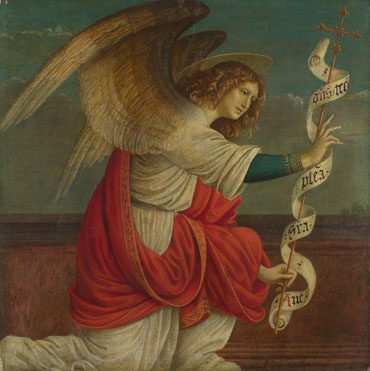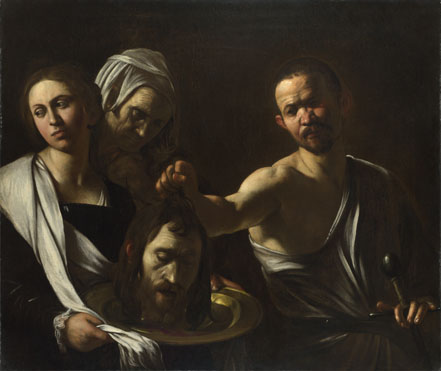
Bucking tradition, the prophet Zechariah writes, “My son’s name is John…”
* * * *
June 24 is the Feast Day for the Nativity of St. John the Baptist.
One valuable lesson from his Bible readings is that sometimes you have to bite the bullet…
The feast day celebrates the birth of John the Baptist, “a prophet who foretold the coming of the Messiah in the person of Jesus, whom he later baptised.” The Bible readings are Isaiah 40:1-11, Psalm 85, Acts 13:14b-26, and Luke 1:57-80. Luke tells how Elizabeth – cousin of Mary (mother of Jesus) – came to be a mother, and how her husband got struck dumb.
The time came for Elizabeth to give birth, and she bore a son. Her neighbors and relatives heard that the Lord had shown his great mercy to her, and they rejoiced… [T]hey were going to name him Zechariah after his father. But his mother said, “No; he is to be called John.” They said to her, “None of your relatives has this name.” Then they began motioning to his father to find out what name he wanted to give him. He asked for a writing tablet and wrote, “His name is John…”
The story of Zechariah getting struck dumb started at Luke 1, verses 5-7. He was a member of the “priestly order of Abijah,” and he and Elizabeth were righteous before God but also old and childless. Then God sent an angel to tell Zechariah he was about to become a father. He got struck dumb because he doubted the angel. (That’s where biting the bullet came in. Zechariah should have accepted on faith what was, to him, counterintuitive.)
 That is, nine months earlier – as Zechariah was doing his priestly duties in the inner sanctuary – the angel Gabriel (at left) appeared and told him Elizabeth would bear a son. But he doubted: “How will I know that this is so? For I am an old man, and my wife is getting on in years.“ And that was why he was struck dumb. As Gabriel told him, “Since you didn’t believe what I said, you will be silent and unable to speak until the child is born.” Luke 1:20.
That is, nine months earlier – as Zechariah was doing his priestly duties in the inner sanctuary – the angel Gabriel (at left) appeared and told him Elizabeth would bear a son. But he doubted: “How will I know that this is so? For I am an old man, and my wife is getting on in years.“ And that was why he was struck dumb. As Gabriel told him, “Since you didn’t believe what I said, you will be silent and unable to speak until the child is born.” Luke 1:20.
That came right after Zechariah wrote out, “His name is John.” See Luke 1:64, saying that right after Zechariah wrote his son’s name, “Immediately his mouth was opened and his tongue freed, and he began to speak, praising God.” Then – right after that – came the Benedictus (Song of Zechariah), “the song of thanksgiving uttered by Zechariah on the occasion of the birth of his son, John the Baptist” (and – no doubt – his being able to speak again):
The second part … is an address by Zechariah to [his son John], who was to take so important a part in the scheme of the Redemption; for he was to be a prophet, and to preach the remission of sins before the coming or the Dawn from on high. The prophecy that he was to “go before the face of the Lord to prepare his ways…” [See Luke 1:76,] an allusion to the well-known words of Isaiah 40:3 which John himself afterwards applied to his own mission (John 1:23), and which all three Synoptic Gospels adopt (Matt 3:3; Mark 1:2; Luke 3:4).
The reading ends with Luke 1:80; the child John “grew and became strong in spirit; and he lived in the wilderness until he appeared publicly to Israel.”
Note that Isaiah 40:3 is included in the Old Testament reading for the day, Isaiah 40:1-11. Isaiah 40:3 says (in one translation): “A voice cries out in the desert: ‘Clear a way for the LORD. Make a straight highway in the wilderness for our God.'” Thus John the Baptist became that voice crying in the wilderness, as noted in Matthew 3:3: This is he who was spoken of through the prophet Isaiah: “A voice of one calling in the wilderness, ‘Prepare the way for the Lord, make straight paths for him.’“
Which is another way of saying that John the Baptist served as a precursor, forerunner or advance man for Jesus. (As in, “News Flash: Jesus is on the way!“) Or as it says in the Collect: “your servant John the Baptist … sent to prepare the way of your Son our Savior.”
The Collect adds that we too should follow John’s example, and so to “constantly speak the truth, boldly rebuke vice, and patiently suffer for the truth’s sake.” (See Nativity of St. John.)
For more on how John “grew and became strong in spirit,” see John the Baptist – Wikipedia:
John’s knowledge of Jesus varies… In the Gospel of Mark, John preaches of a coming leader, but shows no signs of recognizing that Jesus is this leader. In Matthew, however, John immediately recognizes Jesus and John questions his own worthiness to baptize Jesus. In both Matthew and Luke, John later dispatches disciples to question Jesus about his status, asking “Are you he who is to come, or shall we look for another?” In Luke, John is a familial relative of Jesus whose birth was foretold by Gabriel. In the Gospel of John, John the Baptist himself sees the spirit descend like a dove and he explicitly preaches that Jesus is the Son of God.
See also Who Was John the Baptist? : Christian Courier, which noted that his name derived from “a Hebrew term signifying ‘Jehovah is gracious.'” The article also noted that “John, therefore, was a key figure in the preparation of the Messiah’s work.”
Unfortunately, that “advance work for Jesus” included a gruesome death by beheading, as told in Mark 6:14–29: “the king sent a soldier of the guard with orders to bring John’s head. He went and beheaded him in the prison, brought his head on a platter, and gave it to [Salome]… When his disciples heard about it, they came and took his body, and laid it in a tomb.”
So this June 24th we celebrate the birth of John the Baptist, who in his lifetime performed an invaluable service as forerunner and advance man for Jesus. His life and especially his gruesome death serves as a reminder that, as one “Christian mystic” said:
“It is to vigor rather than comfort that you are called.”
* * * *

“Salome receives the Head of John the Baptist…”
* * * *
The upper image is courtesy of the link – Benedictus (Song of Zechariah) – in the Wikipedia article, Nativity of St. John the Baptist. The caption: “Detail of Zechariah writing down the name of his son (Domenico Ghirlandaio, 15th century, Tornabuoni Chapel, Italy).”
The “Gabriel” image is courtesy of www.nationalgallery.org.uk/paintings/gaudenzio-ferrari-the-annunciation: “The Angel Gabriel announces to the Virgin Mary that she will bear the son of God (Luke 1: 26-8). His words, ‘Hail Mary full of Grace, the Lord be with you,’ appear in abbreviated form in Latin on the scroll.” Thus Gabriel appeared to both Elizabeth and Mary.
The “Salome” image is courtesy of www.nationalgallery.org.uk/paintings/caravaggio: “The subject is from the New Testament [Mark 6, verses 14-29]. Salome had danced so well for King Herod that he swore he would grant her any request. Her mother, Herodias, who sought revenge on John the Baptist, persuaded Salome to ask for his head. The old woman behind Salome may be Herodias.”
The “vigor-comfort” quote is from Practical Mysticism, with advice for the “new Christian:”
Hearing now and again the mysterious piping of the Shepherd, you realize your own perpetual forward movement . . . and so are able to handle life with a surer hand. Do not suppose from this that your new career is to be perpetually supported by agreeable spiritual contacts, or occupy itself in the mild contemplation of the great world through which you move. True, it is said of the Shepherd that he carries the lambs in his bosom; but the sheep are expected to walk, and to put up with the bunts and blunders of the flock. It is to vigor rather than comfort that you are called. (E.A.)
Evelyn Underhill, Ariel Press (1914), at page 177. See also Evelyn Underhill – Wikipedia.
* * * *